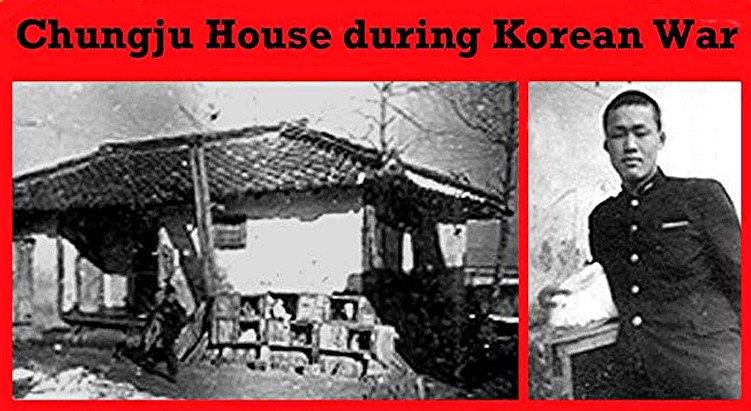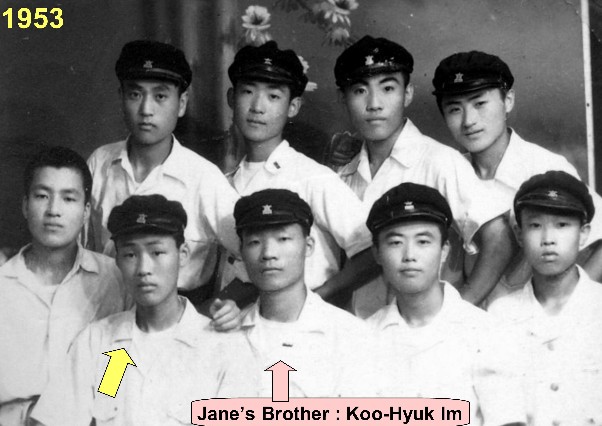|
¡¡
Chungju
High School

After
about an half year of refugee life in Pusan, whole family moved to Chungju,
located in the central part of South Korea, in September 1951 and I joined
Chungju High School. I attended Chungju High School for two and half years
until I graduated the Chungju High School and our family moved back to Seoul
in February 1954. (The school year began in March while I attended
elementary school during the Japanese occupation, but was changed to
September as
U. S. A.
when
U. S.
Army controlled
Korea
after the liberation. Then, it was switched again back to March during my
high school. That¡¯s why it took me only two and half years to finish high
school.)
As
my father was employed for the first time of his life as an English teacher
of Chungju Commercial High School, we lived in a two bedrooms adobe house
which was one of the school houses in the back yard of the school at
Naedukdong at the north end of Chungju. My father, Seong-Koo and I stayed in
one room and my mother, my sister Dong-Sun and my grand mother (my
mother¡¯s mother) in another room.
My
sister, Dong-Sun, was working at the chinaware factory located in front of
the
Chungju
Commercial
High School
. Sung-Koo attended the
Chungju
Middle School
which was practically same school as
Chungju
High School
as both schools were in same campus. Sister Dong-Hyun attended
Yonsei
University
in
Seoul
returning home during summer and winter vacations. My grandmother used to
live with her son but she came to stay with us when her son died. Because
she had a stroke and couldn¡¯t move, my mother had a very hard time for two
years taking care of her mother until she died.
My
uncle (my father¡¯s younger brother) was a dean of the
Chungju
Agricultural
College
, living with my grandmother in Moonhwadong at the downtown of Chungju near
to the provincial government. One of my cousins, who came to Chungju during
the Korean War, was teaching in the
Chungju
Commercial
College
also, living at the middle point between our house and uncle¡¯s house.
Our
yard was so tiny but my father brought 50 American chickens from the
provincial government one day. Since He really loved animals, he kept the
chickens in our room until they grew up too big and we had to built a
chicken coop in the back yard. My father seemed to love the chickens more
than his own children. He fed them with expensive dried anchovies and these
chickens started laying eggs so we could eat them at every meal. They were a
very good source of nutrition for us at the time.
Another
day, he brought a couple of turkeys from the provincial government again,
(To encourage stockbreeding,
U. S.
gave livestock as an aid to
Korea
and distributed them to agricultural districts.) So we had fifty chickens
and two turkeys. In fact, I think we were one of the first family to breed
turkeys in
Korea
. Later, he brought two sheep that made our house similar to the life of
Chungsan, though it was in much smaller scale. The chickens and turkeys were
kept in the yard but the two sheep had to be bounded at the little far a way
from home for better grass field in the morning and brought back home in the
evening everyday by Sung-Koo or me. When it rained, we had to run to the
field and brought the sheep back so they wouldn¡¯t get soaked. The milk of
the sheep was also a good source of nutrition for us at the time.
In
addition to father¡¯s stock, I personally raised rabbits in the front of
the house, which was a kind of fun but also gave me a lot of work to do,
such as collecting fresh grass from the field and changing water for the
rabbits. It was a good opportunity for me to study about rabbits and
chickens. We ate chicken or rabbit often and It was my job of butchery every
time.
My
uncle Hyun-Ha had a car assigned to the dean of the
Agricultural
College
, which was a modified army jeep. One day, my uncle came to visit us and I
convinced the chauffer to let me try driving the car. It was the first time
in my life to drive. As the chauffer explained me the basics of how to
control the car, I started the engine, released the clutch pedal slowly,
stepped on the accelerator softly, started the car and drove round and round
in the playground of the Chungju Commercial High School. Suddenly, I found
myself driving on the street out of the school playground but I hadn't learn
how to stop the car yet. Turning pale from astonishment, the chauffer chased
me. I was baffled but I thought it should stop if I turned the engine off
and stepped on the break pedal firmly. The car stopped. It was really a
dangerous driving and a close call.
I
used to be a normal high school boy and there were nothing special to talk
about. It was just a usual high school life in
Korea
without any special excitement but normal school classes. The students had a
choice of majoring liberal arts and science. For each grade, there were four
classes and two of them were science majors that stressed more on math,
physics, and chemistry. The other two were liberal arts major classes that
stressed more on the arts. I belonged to a science major class and had a
good grade but was never close to 1st or 2nd rank in
my class. Since I was the tallest boy in class, I was always in charge of
standing basis in PE lesson or military training. Whenever I just turned
right, all the short guys at the end of the line had to run to line up.
I
remember an English teacher in
Chungju
High School
, who taught so well as an English teacher. However, when he was promoted to
a principal of the school, he was such a poor principal. I have learned from
him that everyone having a great talent on one subject doesn¡¯t mean he is
talented everything. You have to recognize the limit of yourself and stick
to the limited area where you are really talented. It was a great regret
that he would have been remembered as a respectable English teacher if he
kept teaching English rather than promoted.
I
was an atheist at that time too, same as now. However, I was interested in
the religion and went to church from time to time with friend going to
church. One day, I followed him to his church and heard a pastor preaching;
¡°Scientists advocating the theory of evolution keep saying that men
evolved from apes. But I never heard of any ape in Changgyongwon Zoo that
became a man and registered for citizenship.¡± I thought that the pastor
was either a very stupid guy who had no idea of the theory of evolution or a
cunning man trying to deceive the congregation. Since that time on, I never
went to church. Probably, pastors like him might have created so many
religious fanatics in
Korea
.

Another
remarkable thing is that
Chungju
High School
played match maker role for me and my wife. Koo-Hyuk Im, one of my best
friends in my class is Jane¡¯s elder brother and that was how we met.
However, when I saw her visiting Koo-Hyuk¡¯s house at that time, I didn¡¯t
recognize her as a girl since I was a high school boy and she was a too
small elementary school girl. However, any way, the destiny that drove us to
marry was by having her family hide as refugees from
Seoul
during the Korean War at the same time I did. It was many years later in
Seoul
I started finally to be attracted to her when she was an Ehwa Girl¡¯s High
School senior.
Thanks
to my uncle, my father got a job in
Chungju
Agricultural
College
too (
Choongbook
University
now) as a part-time professor. He taught economic geography and political
geography, which were somewhat related to the geology he majored at
Oberlin
College
in
Columbus
,
Ohio
. One day, one of his students came to my house carrying a heavy sack of
rice on his back to bribe my father not to give him a flunk grade on the
final exam. My father was so angry and let him carry back such a heavy rice
sack after scolding him so severely that I felt sorry for him. Since we
needed rice so much, I can recall my mother was unhappy about her
husband¡¯s uncompromising uprightness, which must be the typical noble
character of the Cho families.
|